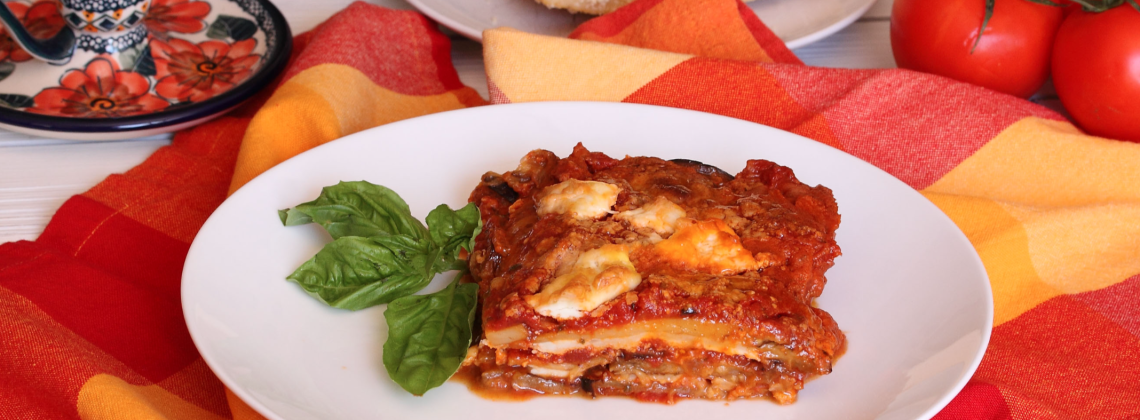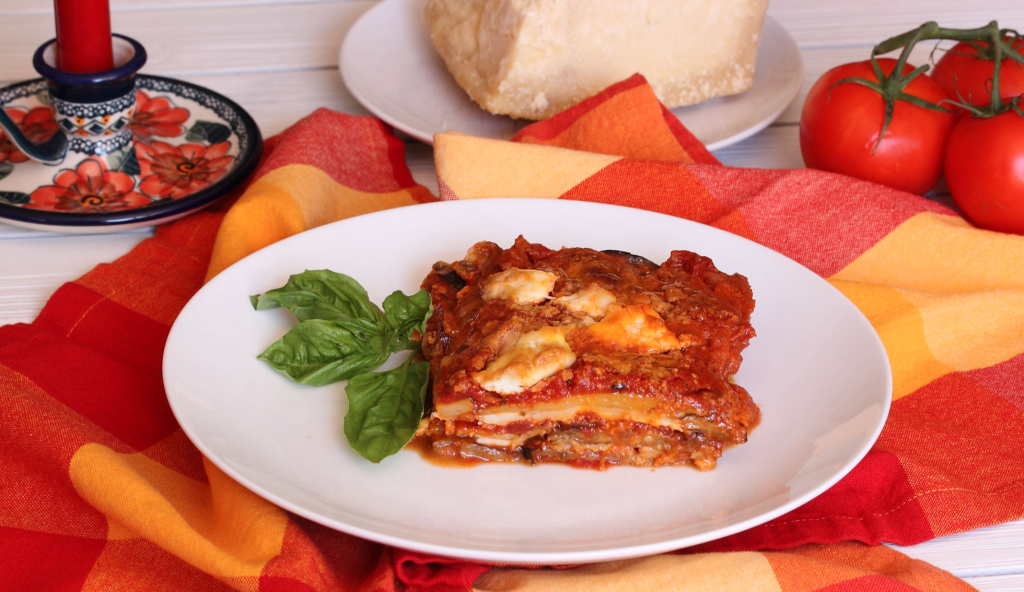

Our culinary traditions can sustain us—when we need it most
While my friends grew up eating turkey or ham for Christmas, my multi-ethnic family celebrated my Italian grandmother’s foodways. Immediate, extended, and chosen family gathered together each year for an amazing home-cooked meal of giant handmade cheese ravioli, loaves of crusty bread, a rich tomato sauce with tiny morsels of the chicken, sausage, and meatballs that had been stewing for days, steaming bowls of tripe and pig’s feet that I avoided at every opportunity, and an eggplant parm that had to be made and frozen months in advance so the flavors could marry.
Italian Christmas, as I came to call it, was an event, and the entire family spent weeks prepping, shopping, and cooking in advance. To this day the smell of garlic sautéing conjures childhood memories of sitting at a huge table in Boston with my grandmother, aunties, and cousins as I slowly forked the edges of homemade ravioli in our makeshift assembly line while the women in my family drank wine, smoked cigarettes, and gossiped about people I didn’t know. I can still hear my father arguing with his siblings in the kitchen as they conspired over a boiling stockpot of tomato sauce, cautiously sprinkling in more herbs and adding red wine as a cousin played lookout. Nana inevitably discovered them, by the way, probably alerted by another cousin, and she would rush into the room like a tornado, yelling at everyone in Italian as she swatted away her children with a wooden spoon.
Where they were loud and boisterous, my shy, non-smoking, teetotaling mother was the exact opposite. She had grown up in a quiet, suburban episode of Leave It to Beaver where Christmas meant my grandfather read the newspaper in his chair while my grandmother carefully basted a ham studded with cherries and pineapple as Bing Crosby crooned “White Christmas” in the background. It was positively Rockwellian.
Still, my mother never expressed any sadness at the absence of what I call American Christmas. We could eat ham and turkey any day of the week, she said. This dinner—and the ritual that went into it—was a long-established tradition that had been passed down from generation to generation. These recipes had crossed an ocean, and this dinner was an important part of my culture, history, and identity as much as it was Nana’s. My mother not only understood that—she fiercely protected it.
By the time I was a teenager we had stopped traveling to Boston for Christmas. Instead, we recreated Italian Christmas at home, maintaining Nana’s foodways without fail until my first year of college, when my dirty laundry and I came home to find a Butterball turkey sitting in the fridge. I remember staring at it with confusion, as if it were a foreign object. Why was it there? Were we making ravioli too? Why was a box of Stove Top on the counter?
My father’s terse reply was that he wanted to try something different that year.
We still had the occasional Italian Christmas in the years following that awkward dinner, but we had American Christmas more often than not. To be fair, you could find traces of my grandmother’s foodways if you looked hard enough. My father’s stuffing was a garlicky mixture of breadcrumbs, sausage, spinach, mushrooms, and oregano. We ate brussels sprouts with pancetta. But we also had Pillsbury crescent rolls, sweet potatoes, gravy, and can-shaped cranberry sauce that slid and jiggled around the serving plate.
This isn’t to say that I was completely cut off from my father’s multi-ethnic cuisine. We still tear the bread, because cutting it brings bad luck. We regularly eat pasta and homemade sauce. My father and I constantly debate the need for fennel in Italian sausage. (I am emphatically anti-fennel, thanks for asking.) Nana’s tomato salad is a summer staple. Cold winter days are made warmer by her garlicky escarole and bean soup. And my grandfather’s foodways are alive and well each time we eat bacalhau fritters or stew and have linguiça and eggs for breakfast.
You see, immigrant families like mine use food to maintain our cultural traditions and practices. Such customs sustain the feelings of community and kinship that so many immigrant families recreate while rebuilding a life in another country’s culture. But the emotional side to a community’s foodways is often overlooked. Somewhere along the way my father and his family had a falling out, and Italian Christmas became an unintended casualty.
For my father, Italian Christmas came to serve as a stark reminder of the isolation he felt from his family, community, and culture. There were years when that relationship had improved and Italian Christmas was back on—only for us to switch to American Christmas in the years immediately after his mother died or the decade when he and his sisters were in a fight. American Christmas allowed him to cover up his grief with mushroom gravy.
But this year, my father has declared, we will have Italian Christmas.
As we prepare to spend our first Christmas together since my mother went into memory care, the emotional side of my father’s foodways have reappeared. The past few months have been a tough transition for both of us, but more so for my father, who has been married to my mother for fifty-three years. This year it is my mother’s cuisine that serves as a reminder of the separation he feels from his family. At a time when he deeply feels my mother’s absence from the house at any given moment of the day, he has chosen to find solace and comfort in Nana’s cooking.
What is amazing is that Italian Christmas is bringing him joy in a season when he needs it the most. It has been a blessing to watch my father’s transformation over the past few weeks as we begin to immerse ourselves in the planning, prepping, and shopping needed to pull this off. I’ve made a batch of eggplant parm to freeze, while my dad has taken care of the ingredients for the homemade ravioli and sauce. I am sure we will argue about the amount of fennel in the sausage (which should be zero if I have my say). My nine-year-old will get a crash course in ravioli making, and he has already agreed to play lookout as I doctor my dad’s sauce. Then on Christmas Day, our immediate, chosen, and found family will gather for an amazing meal—first at my father’s house and later at my mother’s memory care facility where we will bring care packages of sauce for the staff and cookies for my mom and her fellow residents.
So, this year as my family begins to rebuild a life that looks different from before, we find the reason for the season in my grandmother’s foodways, which once again bring connection between the past and present. I think both she and my mother would like that.
Colleen Vasconcellos is Professor of Atlantic History at the University of West Georgia. She is the author of Slavery, Childhood, and Abolition in Jamaica, 1788-1838 (Georgia, 2015) and the co-editor, with Jennifer Hillman Helgren, of Girlhood: A Global History (Rutgers, 2010).
Beautiful writing.